#so kindly transport me back to the fictional world i would better fit in!
Text
i don’t want to be a person i want to be a child in a star wars found family because what’s the point of all this enthusiasm and spunk if i’m not a child in a star wars found family
#caroline talks#i’m about to stand before the stars and rip apart my application to be a human being living on earth in 2021#try again please! this was a fun demo run but i do not like real life!#so kindly transport me back to the fictional world i would better fit in!
79 notes
·
View notes
Text
How Reading Positively Affects Your Brain, Mood, and Relationships

If you love reading, then you'll know how incredible it is to get lost in a work of fiction. Once you're in the zone, it's as if you're transported into a dreamlike state where you can touch, taste, and feel the surroundings and characters that are being described. You can breeze through a good book, unaware even that you're reading words or turning page after page. A good story can affect you and stay with you, long after you've closed the cover. I had just finished reading Calypso by David Sedaris when I realized that the book hadn't just helped me pass some time during lockdown, but it had brought me joy, laughter, and a sense of calm amongst the storm of this new normal.
Does reading bring more than a little escapism? Is it, in fact, a mindfulness tool for those who find meditation too frustrating for a mind that's forever wandering? I called on five experts to reveal exactly what is happening to our brains, mood, mental health, and more when we read a good book.
What Reading Does to Our Brains
Reading plays such a crucial part in learning when we are young—surely, those benefits don't go away once we're older? According to the University of Rochester, our brains are fully formed by age 25, but can reading as adults help keep our brains fit and healthy? In a word, yes. "The benefits of reading on our cognition are well-documented and are associated with increased cognitive function, working memory and higher-order thinking such as creative problem-solving," says learning expert and founder of tassomai.com, Murray Morrison. "Put simply, the sustained, gentle effort of building images in your head as you read keeps your brain fitter than more passive forms of entertainment, like film or TV."
And where a film is often over in 90 minutes, a novel may take days or weeks to complete. "his exercises the memory and gives us time to unconsciously speculate on the directions the plot may take, stimulating the imagination," Morrison explains.
Put simply, the sustained, gentle effort of building images in your head as you read keeps your brain fitter than more passive forms of entertainment, like film or TV.
In fact, reading goes beyond just stimulating your imagination. Natalia Ramsden, the founder of brain optimization clinic SOFOS Associates in London, explains that "when we read certain things, the part of our brain that is activated is the same part as if we were doing those things. Fiction acts as a sort of simulator and this has numerous implications for the way we ‘exercise’ parts of the brain, form new synapses, and strengthen existing ones." This helps to explain why a sad story can leave us feeling emotionally fraught, whereas a thriller could have us on the edge of our seat.
Reading is something that is worth factoring into your daily routine, just as you would brushing your teeth or doing yoga. "Reading is an activity which can keep the brain young—with every page turned or chapter devoured, the brain is working to decipher, store and retain more information," notes Dr. Emer MacSweeney, consultant neuroradiologist at Re:Cognition Health. "Reading provides mental exercise, which is very important in helping to protect the brain against cognitive decline in diseases such as Alzheimer’s. [It] heightens brain function and can help parts of the brain connect. Your brain is a learning machine and it needs to keep learning to optimize performance and improve your memory and thinking ability."
"Reading is more neurobiologically challenging than other methods of gathering information, such as speech or listening," adds MacSweeney. "It helps the brain process information more effectively both verbally and visually."
Not only is reading a good exercise for your brain, but it also helps help you relax and the act of it reduces stress in your body and mind, which can lead to improved mental and physical health. MacSweeney says that reading before bed is a good idea to help you unwind and prepare your body for sleep—just be mindful of reading good old fashioned hard copies instead of e-books, since the light from them can prevent your brain from entering relaxation mode.
7 Ways Lack of Sleep Can Seriously Mess With Your Life (and Health)
What Reading Does to Our Mood and Mental Health
"As an avid reader, I am surely biased when I say there is nothing more delicious, indulgent, or satisfying than becoming lost in a good book," says Ramsden. "Page after page, soaking up spectacular writing bringing to life worlds unknown and characters misunderstood...much more is happening for us than sheer entertainment." She explains that getting lost in a good book provides a form of escapism for many and in doing that, the act of losing yourself in a book can help to lower cortisol levels—the primary stress hormone that can wreaks havoc on our bodies when spiked.
Morrison agrees, saying that reading must be celebrated for its positive mental health impact. "Where so much of our free time is spent at the mercy of dopamine-inducing technology products and cliff-hanger reality TV, the opportunity to sit quietly, comfortably, and lose oneself in a book is a valuable mental balm," he says. "Our brains are simply exhausted by 2020s life. Developing the habit of reading—and reading well—can not only be enlightening, transporting, and inspiring, but can genuinely make our lives happier, more balanced, and more worth living."
It's during times of crisis that reading can be the quiet support we all need. Dr. Maite Ferrin, Consultant Psychiatrist at Re:Cognition Health makes the point that "in crisis, we all need some reassurance and something to hold on to—this is for our personal mental well-being."
Ferrin suggests that now is a good time to take a walk down memory lane. "Reading books from childhood serves as a reminder that things will get back to “normal” or the way we used to like them," he says.
What Reading Does for Relationships
Reading may be a solitary hobby, but it's one that can reap rewards when it comes to our relationships. "Reading fiction develops us emotionally," says Ramsden. "According to Keith Oatley at the University of Toronto, reading makes us think and feel in different ways. As we bond with the fictional characters, we are learning to better understand people both on the pages and off."
She references a team of researches led by Chun-Ting Hsu at the Free University of Berlin, who coined the term "fiction feeling hypothesis," describing how narratives with emotional content actually encourage readers to feel empathy, "activating a special neural network located in the anterior insula and mid-cingulate cortex regions of the brain."
Reading makes us think and feel in different ways. As we bond with the fictional characters, we are learning to better understand people both on the pages and off.
What Different Genres and Types of Books Do to the Brain
Getting lost in a book can have a powerful effect on us. "Reading can be a virtual experience for the brain, so the genre of books we choose to read can have a serious impact on our mood and emotions, giving different virtual experiences," says Dr. Dimitrios Paschos, consultant psychiatrist at Re:Cognition Health. "A book can evoke various emotions, such as happiness, relief, anger, and sadness."
Below, Paschos reveals how different genres and types of books can affect us—plus, we share some of our favorite book recommendations for each genre.
Thrillers
"Reading thrillers adds excitement and can help us step away from our own problems, making us realize that there are people in worse situations than ourselves."
Already hooked, right?
Literary Classics
"Literary books stimulate different parts of our brain and give them an intense workout."
Happy Stories
"Happy books can be highly beneficial to mood and can be a good distraction when you're struggling with the complexities of life, giving hope and assurance that a 'happy ever after' can exist."
"Reading nostalgic books, such as those we read and enjoyed as young adults or teens can take us back to a happier period of our life. Because the book has already been read, there is an element of comfort, safety, and reassurance; you are familiar with the characters, the contents, and, of course, the ending, so uncertainty is eliminated.
For people struggling emotionally throughout this pandemic, reading books about nostalgia can be highly beneficial (and the smell of an old book is just wonderful!)"
Biographies and Autobiographies
"This genre can be hugely beneficial to the intellect as well as emotions. They are history lessons as told through the lives of extraordinary people, teaching us life lessons—the highs, lows, and failures. They can give us validation of our own successes and challenges, strength to face our failures, and the confidence to make self-improvements."
Kindly Share this Post using the Share Tab below and follow all our Social Media Handles to Keep up with Our Daily News Update.
Click to Follow us on Facebook
Click to follow us on Instagram
Click to follow us on Twitter
Donate to Torixus to help us Grow
(adsbygoogle = window.adsbygoogle || []).push({});
via Blogger https://ift.tt/2Wfoda8
0 notes
Photo
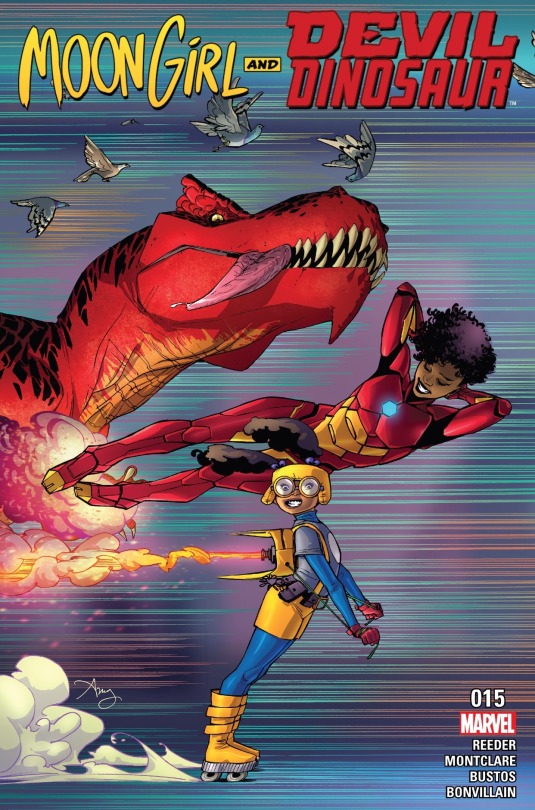
Moon Girl and Devil Dinosaur #15 Review
spoilers spoilers spoilers spoilers spoilers spoilers spoilers spoilers spoilers
The World’s Smartest story-arc continues as we get to see Lunella team up with none other than Riri Williams, the Invincible Ironheart! All from the creative team of Amy Reeder, Brendan Montclare, Natacha Bustos, and Tamra Bonvillain. Full recap and review following the jump.
The story begins with Lunella attacked in her school by a series of robotic tentacles. Lunella wasn’t expecting such an attack and is ill prepared to handle them; her teacher and classmates can only watch on in horror. Lunella uses her communicator to send out an all-heroes SOS and fends off the menacing mechanicals as best she can.

The day is saved when Ironheart swoops in to blast the robotic tentacles with her repulser beams. She had heard Lunella’s SOS and came as fast as she could.
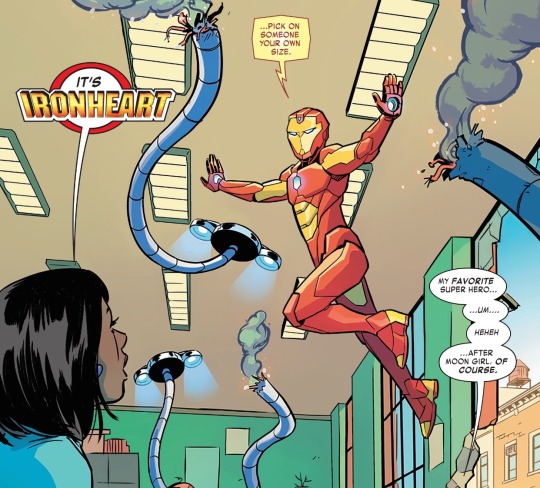
Lunella quickly fixes her backpack helicopter and she and Ironheart fly off, tracking the signal that had been controlling these terrible tentacles.
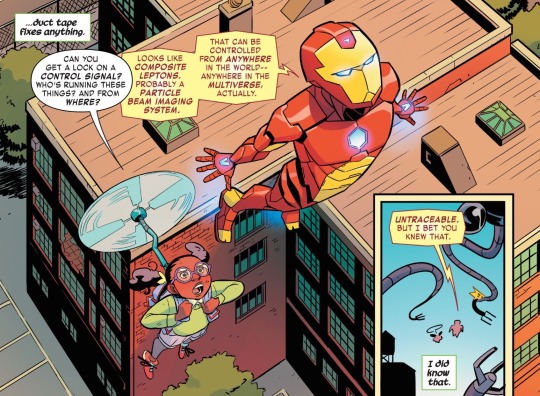
Their chase brings them to a small alleyway between buildings that only Lunella’s small frame can fit through. The ally leads to an alcove where Lunella finds herself face to face with Doctor Doom. Or rather it is a hologram of Doom, but one that issues an ominous warning to her. She has been identified as the world’s smartest and Doom is intent on taking her down so to prove himself the supreme intellect. And with that the villain disappears.
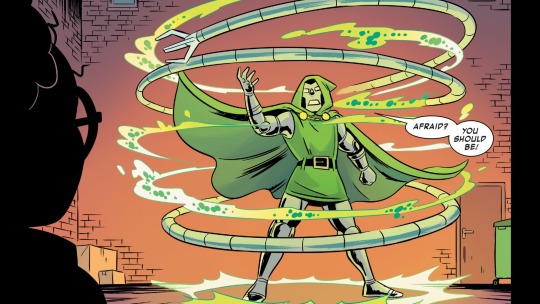
Lunella and Riri retire to Lunella’s secret lab to pool their smarts and try to figure this whole thing out. Riri is a bit suspicious over what Lunella claims to have seen. It’s not outside of reason for Victor Von Doom to menace a nine-year-old, yet it is not quite in sync with what Doom has been up to as of late.
It is hard for Lunella to explain, but who she saw doesn’t resemble The Doctor Doom so much as A Doctor Doom… perhaps a pretender or a version of Doom from he past. Riri doesn’t understand and continues to questions the validity of what Lunella claims to have seen.
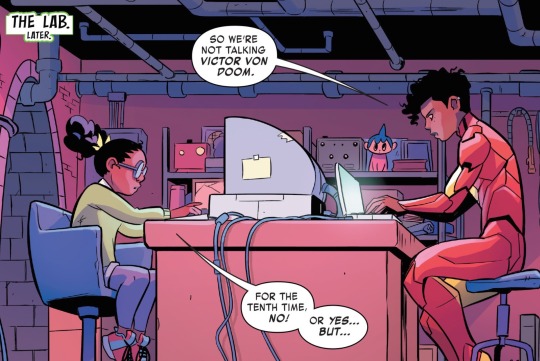
Lunella doesn’t take kindly to having what she saw questioned in this way. She doesn’t feel like she is being taken seriously and it very much hurts her feelings.
Riri can see this and apologizes. She can very much relate to Lunella and how frustrating it can be to untrusted, to be told that older people are always right simply because they’re older. “My whole life has been older people telling me what I can’t do,” Riri says, added “now I’m doing it…” She goes on to say that Lunella has earned the right to be trusted to make the right choices. It’s a very touching scene.
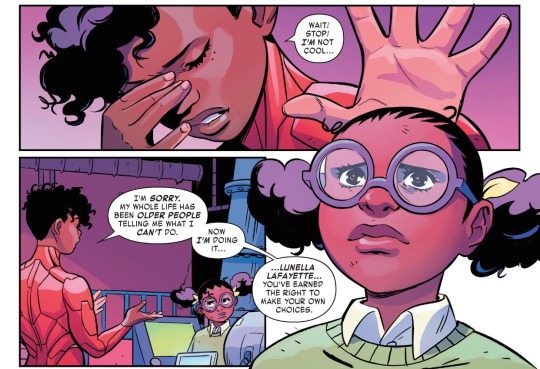
They get back to work and Lunella is eventually able to isolate the signal that had controlled the robotic tentacles. The reason why they hadn’t been able to find it before is that it entails an element that completely defies science: magic. She now knows what to look for, but not how to find it and doing so is going to require an expertise beyond her and Riri’s purview.
Oh, and Devil Dinosaur finally shows up. It turns out that he had spent the day at the Jersey boardwalk trying to win a stuffed animal for Lunella. It’s a poor excuse for why he wasn’t there when Lunella needed him, but at least he did win the teddy bear and Lunella appears happy to receive the gift :).
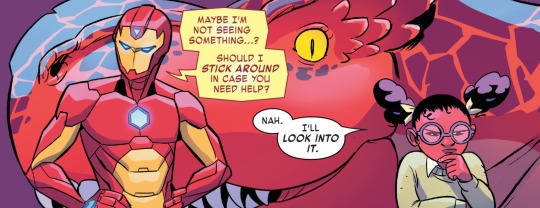
Ironheart heads off, saying that she’ll be available if ever she’s needed and Lunella heads home. Lunella’s mom is clearly not happy about her daughter’s insistence on being a superhero, but there is little she can do to stand in her way. As sort of a conciliation to help Mrs. Lafayette at least feel like she is still a mother in-control, she insists on doing Lunella’s hair.
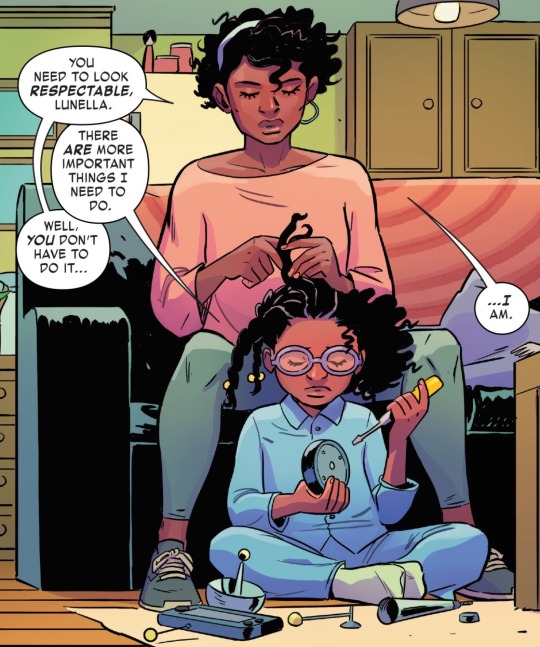
Later that evening, Moon Girl and Devil Dinosaur are back on the streets. Lunella knows that the magical elements of the signal she’s tracking are beyond her abilities to hunt down; but she knows just who to ask to aide her.
On their way to Greenwich Village, Devil Dinosaur accidentally bumps a power line. It sends a quick jolt of electricity through the dinosaur and into Lunella riding on his back. The charge stuns Lunella and she can feel that it has triggered the mind switch whereby her consciousness gets transported into Devil D’s body and his into hers. Lunella has not yet learned to control this power and it’s all too often led to embarrassing mayhem. Lunella tries to hold off the switch as long as she can. They have arrived at where they were heading and Lunella struggles to maintain control of her body just a bit longer, knocking on the door of Dr. Strange’s Sanctum Santorum!

Doctor Stephen Strange answers the door to find Lunella lying on the ground, calling out ‘is there a doctor in the house?!?’ And it is with this cliffhanger that the issue comes to a close with the promise of continuation with the next installment.
Another fantastic ride! As hard as it is to believe, this comic just keeps getting better and better. There is something particularly special about this issue, something quite rare and really important. It’s really one of the only times I’ve seen two young, Black, female heroes share the page in a truly mutual and supportive fashion. It’s sort of like the fabled ‘Bechdel test,’ only with an added extra layer. This test asks whether a work of fiction features at least two women who talk to each other about something other than a man. It seems like an easy thing to accomplish, but it’s often surprising just how many comics, TV shows and movies actually fail to pass. This issue passes the test, but with the extra layer of it being two Black female characters discussing something other than a man. Something that is even more rare!
As a white man, it can be easy for me to overlook just how important and empowering a scene like this can be. I’m used to seeing people who look like me presented as smart and capable and heroic… I take it for granted. Such presentations featuring female characters, and characters who are people of color have been much more rare… and that rareness can enforce the erroneous notion that girls simply aren’t good at such things, that they aren’t scientifically savvy, and supportive and cool. It’s even more rare for such a scene to feature female charters who are people of color and this even further compounds the erroneous and negative notion.
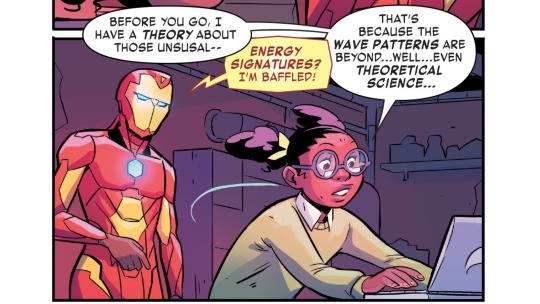
Scene like this, along with movies like Hidden Figures, acts to erode that erroneous notion… it offers an alternative, something that is supportive and inspiring. And it’s extremely important and necessary.
I’ve seen both Lunella and Riri Williams get some flack from fellow longtime comic book fans. This is usually occurs on message boards, chat rooms and anonymous asks, where people feel emboldened by animosity to say pretty nasty things. Some appear to feel threatened by this notion that a little Black girl could be identified as being smarter than Reed Richards; or that a character who looks like Riri Williams could possess the same acumen as Tony Stark. These commenters often hide their racism and sexism behind hackneyed idioms, calling the character such things as ‘Mary Sue(s).’
I don’t think such people fully appreciate the rarity of characters like Lunella and Riri. They don’t know how much it hurts, how discouraging it is that young Black female characters are almost never portrayed as savants in the realm of science and technology. And it doesn’t just hurt them, it hurts all of us. We are facing dire times and we need all hands on deck. There are many challenges in the future and we can no longer afford to hold up the barriers of exclusivity. There’s an even chance that the doctor who discovers a cure for cancer will be a Black woman; that the physicist who gets mankind to Mars will be a Black woman; that the scientist who helps combat climate change will be a Black woman. We can no longer afford to leave anybody out; doing so could very well prove disastrous to us all.

And once more I feel a vicarious sense of pride that The Inhumans are in some way involved in such crucial and needed thing.
Bustos’ art and Bonvillain’s colors are once again immaculate. I could look at their art all day long. My only complaint is a minor one and has to do with the opening scene. I found it a little bit in poor taste to see Lunella attacked in her classroom. The specter of violence in school has become all too real and this scene may prove a bit too frightening for younger readers. It would have been better if the attack had occurred elsewhere.

It’s a minor screw up, but in no way undermines how much I enjoyed this extremely fun and extremely important issue.
Essential reading. Five out of Five Lockjaws!

#Inhumans#Moon Girl and Devil Dinosaur#Amy Reeder#Brendan Montclare#Natacha Bustos#Tamra Bonvillain#spoilers#review#Riri Williams#Ironheart
28 notes
·
View notes
Text
The 5 Most Misused Quirks In My Hero Academia
I’ve always been good at coming up with creative solutions to problems no one will ever have to deal with in real life. For example, if I collected all the Dragon Balls, I wouldn’t waste my time asking Shenron for infinite wishes. I’d ask for a notebook that brought to life whatever you described in it, like a reverse Death Note. LOOPHOLED! Also, I'd tie huge rubber bands to the balls before I summoned the dragon so that when I was done with them and they tried to fly off in every direction, they'd just spring back to me and I could use them all over again. SMORT!
That’s why I get so frustrated while watching My Hero Academia.
I keep seeing what all these fictional characters are doing with their Quirk superpowers and I think to myself: there is a smarter way to use those, guys, like, well...
5. Kurogiri Can Create Free, Renewable Energy
Kurogiri is the black mist supervillain that Kohei Horikoshi came up with while screwing around with the airbrush tool. His Quirk is Warp Gate–the ability to create actual Portal-like portals that he uses to chauffeur the League of Villains and break up bar fights.
In all seriousness, though, Kurogiri is probably one of the most powerful characters in the anime, with their being virtually no limit to how far he can extend his Warp Gate portals. Why then doesn’t he use them to create near-infinite energy? Open two portals one above another, throw in a heavy object inside and watch it fall endlessly. Devise a way to hook a dynamo or something to it and, bam, you have free power that would make Kurogiri a billionaire overnight and a hero to the entire planet. But I understand if Kurogiri doesn’t want to do it. After all, he’s already living the exciting life of… a dive bar bartender. Huh.
Even if Kurogiri only cares about taking down All Might, it would still be much easier to do if he had a literal mountain of money/public goodwill at his side. As is, using his overpowered Quirk to transport other villains is like using faster-than-light travel to be the first in line for Backstreet Boys concert tickets.
4. Koji Koda Could Help Feed Billions Of People
Koji is the resident Class 1-A stoner (get it? he's made of rock? come on) with the power to control ANY creature in the animal kingdom. This would logically also include spiders, meaning that Koji could literally end all street crime in, like, 5 minutes tops by swallowing all the criminals up in a giant arachno-tsunami.
But, you see, Koji is just too shy and nice to be an effective hero. He wants to do good but he just doesn’t have that fighter instinct in him. Which is why he should instead use his Anivoice Quirk to revolutionize agriculture all around the world.
Give him a megaphone and fly him over American fields, telling feral pigs to stop causing $1.5 billion worth of damage a year in destroyed crops. Fly him to Australia to tell the invasive cane toads and rabbits to kindly lemming themselves off a cliff. Have him tell the aggressive lionfish the get the hell out of the Atlantic. FORCE HIM TO GET OVER HIS FEAR OF BUGS AND MAKE AGRICULTURAL PESTS A THING OF THE PAST. If Koji was utilized properly, he could travel the world undoing mankind’s mistakes and creating organic, pesticide-free crops instead of doing what he does now, which is largely sitting around on his ass roleplaying Snow White.
3. Inko Midoriya Would Have Made A Great Nurse
Izuku’s mother in My Hero Academia has mainly done two things so far: jack and squat. She did try to be a good mother but kind of failed at that when she tearfully apologized to her son because he was born without a Quirk, essentially telling him: “I’m so sorry I gave birth to such a loser.” So, she doesn’t really have much going on in her life. That’s why she should try nursing instead.
I realize that becoming a nurse takes a lot of hard work and dedication, but Inko would be a natural fit for it. Despite her initial shortcomings, she is a very caring person with loads of empathy. She also has the power of limited telekinesis.
Inko can move small objects over short distances, and while that would not be helpful for stopping crime, it would be great for, say, removing kidney stones. Or things stuck in people’s throats. Or coins from children’s stomachs. Or, well, anything out of people’s buttholes, all without having to actually… you know, get in there. Not only would it save any hospital god knows how much money on gloves, Inko would be doing something worthwhile with her life and making a real difference. But sitting at home alone while Izuku lives it up in his dorm is just as fulfilling, surely.
2. Uraraka Should Go Work For A Shipping Company
Ochaco Uraraka has one of the most well-rounded Quirks out of all the main characters: Zero Gravity. With it, she can make objects and people float, which is great for offense, defense, and rescue operations. As a superheroine, she is doing everything right with her Quirk.
I just think Uraraka should never have become a superheroine in the first place. Uraraka has actually always been honest about her motivation: she wants dem YEN YEN BILLS YO (for her struggling family.) Superheroes are paid a lot in My Hero Academia and even get endorsement deals and the like—in the future, I envision Bakugo endorsing some brand of hot sauce. But regular jobs also exist in that world, and that must include shipping companies that would instantly hire Uraraka to Zero-G their freighters, trucks, and planes.
Even if she cannot make them float, she can still remove enough gravity from them to save the company tons of fuel. Company profit margins are razor thin. There’re probably accountants out there who specifically don’t use semicolons in their print documentation because those use more ink than regular commas, and that means lost profits. The notion of saving even 1% on fuel costs would be game-changing for them, and Uraraka could probably go way higher than that while collecting a check fatter than the boners some of those company accountants would be sporting.
1. Momo Could Solve Literally All The World’s Problems
I bet Kohei Horikoshi was really proud of himself when he came up with Momo Yaoyorozu’s design: No, see, she HAS to dress scantily because her Quirk is Creation, i.e. the ability to create any object she wants through her skin, which must be constantly exposed. Peachy.
What’s not peachy, though, is Momo’s motivation. Momo is supposed to be a genius. As such, she should know that she’s wasting her Quirk on superheroics when she should instead be, oh I don’t know, actually saving the world.
Momo can apparently create anything as long as she understands its composition, and seeing as she’s made an ethanol spray can, infrared goggles, a lighter, and a tracker, it seems like there’s nothing she cannot make. Cool. MAKE US SOME HELIUM THEN. The world is running out of the gas and we need it for MRI scanners and the like. Momo could make more of it. Or thorium. She could make thorium that we could use to make thorium-based reactors that are apparently way safer than uranium ones.
Medicine, fresh water, cheap electronics that we could send to developing countries: Momo could crank all of those out in an afternoon. An hour sitting in a room and filling bucket after bucket with free insulin would do more good for the planet than defeating 10 Leagues of Villains. And while spending your life as a walking Everything Faucet might not seem that glamorous, it actually has the potential to change the entire planet for the better.
Are there any other Quirks that you think are being misued in My Hero Academia? Share your theories in the comment section!
---
Cezary writes words on the internet. Follow him on Twitter or check out his websites here and here.
Do you love writing? Do you love anime? If you have an idea for a features story, pitch it to Crunchyroll Features!
0 notes
Text
How Reading Positively Affects Your Brain, Mood, and Relationships

If you love reading, then you'll know how incredible it is to get lost in a work of fiction. Once you're in the zone, it's as if you're transported into a dreamlike state where you can touch, taste, and feel the surroundings and characters that are being described. You can breeze through a good book, unaware even that you're reading words or turning page after page. A good story can affect you and stay with you, long after you've closed the cover. I had just finished reading Calypso by David Sedaris when I realized that the book hadn't just helped me pass some time during lockdown, but it had brought me joy, laughter, and a sense of calm amongst the storm of this new normal.
Does reading bring more than a little escapism? Is it, in fact, a mindfulness tool for those who find meditation too frustrating for a mind that's forever wandering? I called on five experts to reveal exactly what is happening to our brains, mood, mental health, and more when we read a good book.
What Reading Does to Our Brains
Reading plays such a crucial part in learning when we are young—surely, those benefits don't go away once we're older? According to the University of Rochester, our brains are fully formed by age 25, but can reading as adults help keep our brains fit and healthy? In a word, yes. "The benefits of reading on our cognition are well-documented and are associated with increased cognitive function, working memory and higher-order thinking such as creative problem-solving," says learning expert and founder of tassomai.com, Murray Morrison. "Put simply, the sustained, gentle effort of building images in your head as you read keeps your brain fitter than more passive forms of entertainment, like film or TV."
And where a film is often over in 90 minutes, a novel may take days or weeks to complete. "his exercises the memory and gives us time to unconsciously speculate on the directions the plot may take, stimulating the imagination," Morrison explains.
Put simply, the sustained, gentle effort of building images in your head as you read keeps your brain fitter than more passive forms of entertainment, like film or TV.
In fact, reading goes beyond just stimulating your imagination. Natalia Ramsden, the founder of brain optimization clinic SOFOS Associates in London, explains that "when we read certain things, the part of our brain that is activated is the same part as if we were doing those things. Fiction acts as a sort of simulator and this has numerous implications for the way we ‘exercise’ parts of the brain, form new synapses, and strengthen existing ones." This helps to explain why a sad story can leave us feeling emotionally fraught, whereas a thriller could have us on the edge of our seat.
Reading is something that is worth factoring into your daily routine, just as you would brushing your teeth or doing yoga. "Reading is an activity which can keep the brain young—with every page turned or chapter devoured, the brain is working to decipher, store and retain more information," notes Dr. Emer MacSweeney, consultant neuroradiologist at Re:Cognition Health. "Reading provides mental exercise, which is very important in helping to protect the brain against cognitive decline in diseases such as Alzheimer’s. [It] heightens brain function and can help parts of the brain connect. Your brain is a learning machine and it needs to keep learning to optimize performance and improve your memory and thinking ability."
"Reading is more neurobiologically challenging than other methods of gathering information, such as speech or listening," adds MacSweeney. "It helps the brain process information more effectively both verbally and visually."
Not only is reading a good exercise for your brain, but it also helps help you relax and the act of it reduces stress in your body and mind, which can lead to improved mental and physical health. MacSweeney says that reading before bed is a good idea to help you unwind and prepare your body for sleep—just be mindful of reading good old fashioned hard copies instead of e-books, since the light from them can prevent your brain from entering relaxation mode.
7 Ways Lack of Sleep Can Seriously Mess With Your Life (and Health)
What Reading Does to Our Mood and Mental Health
"As an avid reader, I am surely biased when I say there is nothing more delicious, indulgent, or satisfying than becoming lost in a good book," says Ramsden. "Page after page, soaking up spectacular writing bringing to life worlds unknown and characters misunderstood...much more is happening for us than sheer entertainment." She explains that getting lost in a good book provides a form of escapism for many and in doing that, the act of losing yourself in a book can help to lower cortisol levels—the primary stress hormone that can wreaks havoc on our bodies when spiked.
Morrison agrees, saying that reading must be celebrated for its positive mental health impact. "Where so much of our free time is spent at the mercy of dopamine-inducing technology products and cliff-hanger reality TV, the opportunity to sit quietly, comfortably, and lose oneself in a book is a valuable mental balm," he says. "Our brains are simply exhausted by 2020s life. Developing the habit of reading—and reading well—can not only be enlightening, transporting, and inspiring, but can genuinely make our lives happier, more balanced, and more worth living."
It's during times of crisis that reading can be the quiet support we all need. Dr. Maite Ferrin, Consultant Psychiatrist at Re:Cognition Health makes the point that "in crisis, we all need some reassurance and something to hold on to—this is for our personal mental well-being."
Ferrin suggests that now is a good time to take a walk down memory lane. "Reading books from childhood serves as a reminder that things will get back to “normal” or the way we used to like them," he says.
What Reading Does for Relationships
Reading may be a solitary hobby, but it's one that can reap rewards when it comes to our relationships. "Reading fiction develops us emotionally," says Ramsden. "According to Keith Oatley at the University of Toronto, reading makes us think and feel in different ways. As we bond with the fictional characters, we are learning to better understand people both on the pages and off."
She references a team of researches led by Chun-Ting Hsu at the Free University of Berlin, who coined the term "fiction feeling hypothesis," describing how narratives with emotional content actually encourage readers to feel empathy, "activating a special neural network located in the anterior insula and mid-cingulate cortex regions of the brain."
Reading makes us think and feel in different ways. As we bond with the fictional characters, we are learning to better understand people both on the pages and off.
What Different Genres and Types of Books Do to the Brain
Getting lost in a book can have a powerful effect on us. "Reading can be a virtual experience for the brain, so the genre of books we choose to read can have a serious impact on our mood and emotions, giving different virtual experiences," says Dr. Dimitrios Paschos, consultant psychiatrist at Re:Cognition Health. "A book can evoke various emotions, such as happiness, relief, anger, and sadness."
Below, Paschos reveals how different genres and types of books can affect us—plus, we share some of our favorite book recommendations for each genre.
Thrillers
"Reading thrillers adds excitement and can help us step away from our own problems, making us realize that there are people in worse situations than ourselves."
Already hooked, right?
Literary Classics
"Literary books stimulate different parts of our brain and give them an intense workout."
Happy Stories
"Happy books can be highly beneficial to mood and can be a good distraction when you're struggling with the complexities of life, giving hope and assurance that a 'happy ever after' can exist."
"Reading nostalgic books, such as those we read and enjoyed as young adults or teens can take us back to a happier period of our life. Because the book has already been read, there is an element of comfort, safety, and reassurance; you are familiar with the characters, the contents, and, of course, the ending, so uncertainty is eliminated.
For people struggling emotionally throughout this pandemic, reading books about nostalgia can be highly beneficial (and the smell of an old book is just wonderful!)"
Biographies and Autobiographies
"This genre can be hugely beneficial to the intellect as well as emotions. They are history lessons as told through the lives of extraordinary people, teaching us life lessons—the highs, lows, and failures. They can give us validation of our own successes and challenges, strength to face our failures, and the confidence to make self-improvements."
Kindly Share this Post using the Share Tab below and follow all our Social Media Handles to Keep up with Our Daily News Update.
Click to Follow us on Facebook
Click to follow us on Instagram
Click to follow us on Twitter
Donate to Torixus to help us Grow
(adsbygoogle = window.adsbygoogle || []).push({});
via Blogger https://ift.tt/2Wfoda8
0 notes